The team had been hitched to the wagon before dawn, but Virgil still hadn’t left. As Laura Miller folded and sorted the new fabrics for display, she could see the stout draft horses through the front window of the store. They stood, patient as time itself, in the first light of the day.
Laura liked this frontier town best in the morning. If she were to walk Grantham’s two streets now, she would undoubtedly see bodies. Almost all of them would be sleeping off a drunk, but one or two might be dead, of overwork or disease or from that lethal combination of being too quick with a mouth yet not quick enough with a pistol.
Grantham was a boom town, flush with silver. That made it a hard place for honest folk to get a good night’s sleep. But at dawn, wasn’t every place born anew? And if you squinted, and were careful to step over the drunks and look past the whores, you could see the potential of the place, the potential of the West.
This was a place to grant new hope for saints and sinners, miners and cowboys, outlaws and lawmen, whores and mothers. And everyone, no matter who they were, wanted for a thousand things to make their dreams real or bring an end to their nightmares. Most of the time the things they needed were simple like shovels and pans, beans and thread, rope and coffee, cartridges and knives. Which meant that all of them, good and bad alike, needed the Miller General store.
In contrast with the patient horses outside, her husband Virgil hadn’t stopped pacing. She wanted to say that she had never before seen a man move so much without actually going anywhere, but she knew to hold her tongue. She loved him, and knew him to be was a worrier.
As Virgil paced the length of the store, he checked the shelves, straightening things that had already been straightened. He looked upstairs to where their daughter slept, and out back at their son, gathering wood. Laura folded a sample of the new Gingham and pretended she wasn’t watching her fierce man and his tender conundrum.
She had never seen Virgil afraid of anything, at least not while facing it. But since the children had come, he had become a worrier. Grantham was a rough, wild town, and she knew the last thing he wanted was to have his son turn out like him. Virgil had been a wild, murderous falcon of a man when they had met. Every time he went on a journey, they both remembered that falcons were never tamed for life. A falcon would always go back to the wild.
She had snared him with all the subtle and ancient ties that women use to capture wild men. She had done it, at first, because she had needed him to survive, but now she realized, the cords that bound them together were woven from the stuff of her own heart. She had trapped them both in the same snare.
Virgil looked to the wagon, then paced back to pour more coffee from the pot on the cast-iron stove.
Mac came in with the firewood and dumped it in the bin next to the stove. By noon, they’d have the doors open and the heat of the day would be oppressive, but night in the high desert was cold no matter the time of year.
“Pa, you want I should come with you?”
Virgil smiled, his sharp face softened by love. “No. I need you to stay here and look after the store.”
She thought it a foolish thing to say. Mack was still so young, but boys were fragile at his age. And her husband knew how badly his son wanted to be a man. As he took in the words, Mack straightened nervously, nodding, taking the responsibility seriously.
With this new respect, Mac dared a question. “Pa, when you get back, can we shoot the big gun?” he asked, looking to the Sharps .50 rifle hanging high on the wall above the vertical rack of smaller caliber rifles and carbines.
“Not until you’re full-grown, if then. But ain’t much point in it.”
Virgil resumed pacing, but Mac continued to look at him so insistently, he stopped and resumed his answer instead. “They were used to hunt buffalo, and they’re about all gone now, son. And there never was any down here anyway.”
“Couldn’t you hunt other things with it?”
“You could, but most men can’t even fire it. Or wouldn’t want to. Least not more than once. Kicks like a mule. Probably break your shoulder.”
“But not your shoulder,” said Mac, with pride.
Virgil considered the gun and winced a little. “I’d only fire that thing if I absolutely had to. You don’t even need something that big to kill a grizzly.”
“Then why do you have it Pa?”
“Because everyone wants to come in here and have a look at the biggest rifle they’ve ever seen. And once they come, they buy their flour and their sugar here instead of at somebody else’s store.”
“Will you ever let me shoot it?”
Virgil smiled and put his hand on the boy’s shoulder. “Alright, someday, when you’re taller than me or when the town gets overrun by elephants, whichever comes first.”
Laura placed the last of the fabric in the glass case and closed the top. She walked over to her husband, kissed him on the cheek, and took his coffee from him. “You’re wasting daylight, Mr. Miller.”
“I’m admiring the view, Mrs. Miller,” he said, as he took her in his arms and kissed her. Then he turned to Mac and said, “Mind your Mother and keep her and your sister safe.”
Mac nodded, taking that seriously too.
Virgil stepped behind the main counter and took his gun belt off a peg beneath the cashbox. Unlike the fancy rigs the cowboys liked to wear around town, this belt had pistols in two cavalry holsters that closed with heavy flaps. Also on the belt was a knife with a carved antler handle in a fringed sheath like the Indians wore.
The heavy Colt Army pistols were set in the holsters with the handles facing forward, so they’d be easier to draw in a gallop. Where other men wore belts of fancy, tooled leather, worked with silver, the leather on this belt was all but invisible. Every free inch of the belt was covered with fabric loops, and in every loop was a .45 caliber bullet. It was ugly and worn. Mack watched, wide-eyed, as his Father belted it on.
His father rarely wore his pistols and Mack had never even seen shoot them, not even for target practice. In fact, he had never seen the pistols out of their holsters. All he knew of them were that the handles were made of simple wood, nothing special.
Virgil took his hat off the peg on the wall and snugged it on his head. This hat had once been white, but he had worn it so long it was battered and scuffed and stained in places, and fit all the better for it.
Virgil walked out of the front door of the store and looked down at the wagon, its emptiness enhanced by the loose canvas tarp in the back. Then he looked up at the sky. Clear, no sign of weather. Laura and Mack came to see him off. Virgil was about to ask Laura to go get Pen, but Laura indicated the back of the wagon with a nod of her head. He took the hint and said, “Well, shame that no-account daughter of mine ain’t here to see her father off. But all the same, I never liked her frowning face overmuch anyways.”
The canvas cover in the back of the wagon exploded upwards and a tornado of strawberry blonde hair announced itself by saying, “I was going to come with you!”
And there was Penelope in all her 8-year-old glory. She pouted savagely at her father with a face that was like to break his heart. She had Daddy’s number, that was sure, thought Laura.
Virgil held out his arms and Penelope dove into them crying, “Don’t go!”
He stepped down from the porch and stood the little girl on the wagon so he could look her in the eyes. Then he said, “Just a couple of days. I have to go remind Mr. Fetterman of his contract with us and collect our flour at the price he promised. Otherwise, people here in town aren’t going to be able to have bread and cakes and cookies. And you wouldn’t want that, would you?”
“No biscuits either?”
“No biscuits either.”
“Well that’s okay,” said Penelope, playing at trapping her father, “I don’t like biscuits anyway.”
They all laughed. Mack climbed up in the back of the wagon and he and his sister played at bouncing the wagon on the springs by jumping up and down. Only their children could make riding in the back of a wagon on a bad road a game.
Virgil said to Laura, “Just a couple of days. Less than three if I don’t have to go to Tuscon.”
“Why would you have to go all the way to Tuscon?” Laura asked.
“If we need a new supplier, that’s the place. Gonna have to happen sooner or later if Fetterman is holding us ransom over the price.”
She saw another look of worry cross Virgil’s face and said, “You’re a good man, Virgil.”
“No, I’m not,” he said without a smile.
“You weren’t, but you are now,” said Laura.
Virgil pressed his lips together and looked sideways down the street.
“Oh Virgil, sooner or later, your present is going to catch up with you. You’re going to have to resign yourself to being happy.”
A look of fear filled Virgil’s eyes. A deep terror that Laura had never seen in her husband before. He said, “That ain’t how life works.”
“We’ve come through our bad spell and you know it,” she said, getting angry, even though she didn’t want to. “Why can’t you just enjoy things when they are good?”
She was shocked to see tears brimming in his eyes. “Because everything good I ever had was taken from me in the end.”
She hugged him tight and whispered in his ear, “Nothing is taking us from you. Or you from us. You understand?” Her words were quiet but had power in them, like the sound of a storm far, far off over the prairie. Then she looked him in the eye, forced a smile on her face, and said, “All this fatalism is scaring me, Mr. Miller. Now you go, you get our business straightened out and you come back to us.”
“Yes ma’am. Not wild horses, nor loose women can keep me away.”
Laura didn’t smile. She looked in him dead in the eye, as serious as the barrel of a gun, and said, “You promise.”
He nodded.
Then she said, “Get gone and get back Mr. Miller.” She kissed him in a way that made it hard to leave.
Virgil drove the wagon East through town just as it was waking up. Past the Morning Star mine, the Morning Star saloon, the First Bank of Grantham on the left, Johnson’s livery on the right with its overflowing stables, the foundry already throwing off heat and the smells of sweat and slag. He continued down the hill across the dry wash that never saw water but for a trickle in the early spring. The horses scrambled up the rocky cut on the far side and then he was on the road to Bisbee.
He didn’t look back, but as the sun rose and the day went on, he thought long and hard about the man he would have been if he hadn’t met her. He was pretty sure he wouldn’t have been proud of that man. And certain that man would have been dead by now.
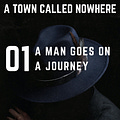





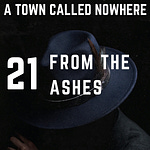
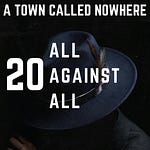
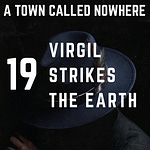
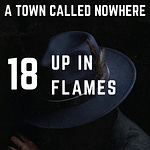
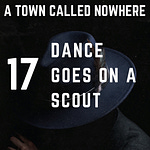
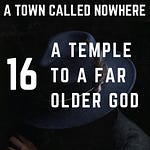
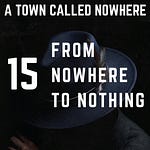
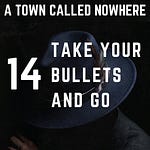
Nowhere Ch 1 - A Man Goes on a Journey